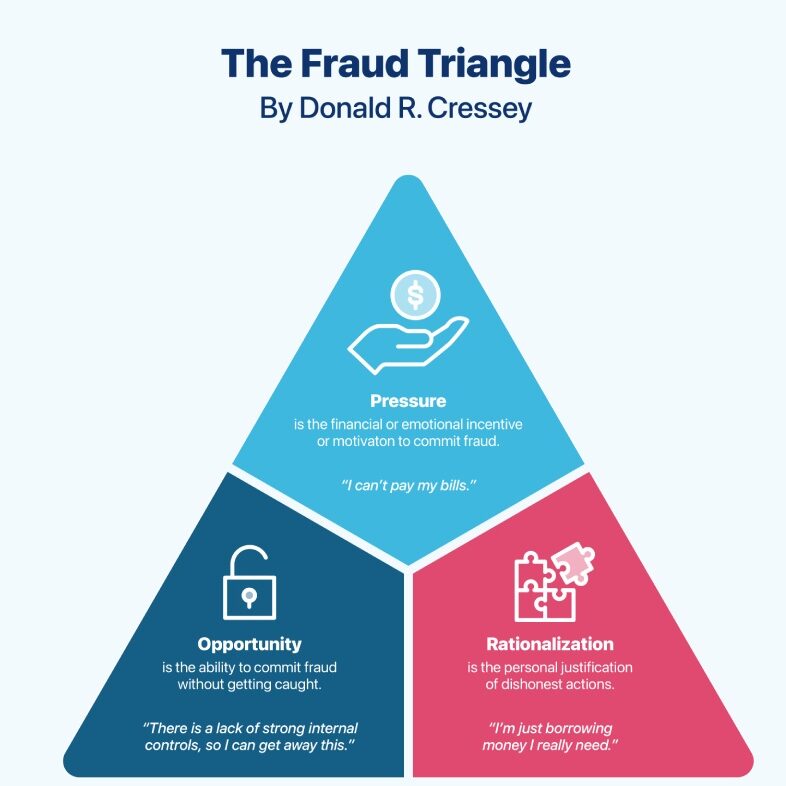This month at the eLearning Africa conference, I had the privilege of joining a panel on one of the most pressing topics in education today: academic integrity in the age of AI.
There is no question that AI has changed the rules. Tools like ChatGPT, Grammarly, and other generative technologies have made it easier than ever for students to blur the lines of authorship and originality. This has led many institutions to ask a natural question: “How do we stop students from using AI to cheat?”
But I believe we’re asking the wrong question.
Reframing the Problem: Why, Not How
Rather than focusing solely on how students cheat, we need to understand why they do it. During the panel, I introduced a concept borrowed from the world of banking fraud: the Cressey Fraud Triangle.

This model outlines three drivers of dishonest behaviour:
- Pressure – personal, academic, or professional stress
- Opportunity – the means or access to cheat
- Rationalisation – the justification for crossing the line
These three points form a triangle, and the larger the triangle, the greater the potential for misconduct. With AI, the “opportunity” corner of this triangle has dramatically expanded. But rather than trying to eliminate opportunity entirely, which is nearly impossible, we should focus on reducing pressure and rationalisation.
What Can Institutions Do?
This is where Learning Management Systems (LMS) like Moodle can make a meaningful difference. Far from being passive platforms, LMSs can actively support academic integrity by shaping behaviour, expectations, and culture.
Here are some of the practical strategies we discussed:
1. Embed Integrity into the Learning Experience
Include academic integrity policies on every course page. Make expectations visible, not buried in a handbook.
2. Require Academic Integrity Training
Use Moodle to create a short course on responsible academic conduct, and set it as a requirement before assignment submissions. Tools like the Subcourse plugin make this easy to scale.
3. Reward Ethical AI Use
Update assessment rubrics to include criteria like “Properly discloses any AI-generated input 5 pts.” This sets clear expectations for ethical engagement with AI.
4. Open Up Conversations About AI
Create discussion forums focused on AI-related dilemmas. These aren’t just tech issues, they’re values-based conversations that help students reflect on their own judgment.
5. Ask for Disclosure
At assignment submission, add a checkbox or short prompt: “Did you use AI assistance? Please describe how.” Normalising transparency is better than trying to police every tool.
6. Track Engagement, Not Just Output
Use Moodle’s reporting tools to monitor completion of integrity training, discussion participation, and other signals of academic engagement, not just final grades.
Collaboration is Key
There are so many examples, too many to count, where institutions have taken the wrong approach, acted before looking to see what their peers are doing. The end up implementing actions and policies that just create more pressure on students and or increase their rationalisation for cheating. This isn’t a problem one institution or one platform can solve alone. Initiatives like the Global Academic Integrity Network (GAIN) and the European Network for Academic Integrity (ENAI) show what’s possible when we collaborate across borders. They promote proactive approaches that involve partnership with students, build trust and ownership rather than focusing on mistrust and punitive actions.
At Catalyst IT, we’re proud to support institutions using Moodle to take a proactive, student-centred approach to integrity. Ultimately, this isn’t about catching students out; it is about designing environments where they are less likely to feel the need to cheat at all.
Final Thoughts
The age of AI is here, and it’s evolving faster than any of us can predict. But rather than trying to keep one step ahead of the tools, we can take big strides by understanding the motivations behind misconduct.
If we want students to act with integrity, we need to lead with it too. Develop and implement policies and take actions to build a culture of academic integrity across your institution. It is with this culture that we can tackle the three elements: Opportunity, Pressure and Rationalisation.
Start strengthening your academic integrity strategy today. Book a call with our team to explore how Moodle can support a culture of trust, transparency, and ethical AI use across your institution.
With Catalyst, you have the Freedom to Innovate.

